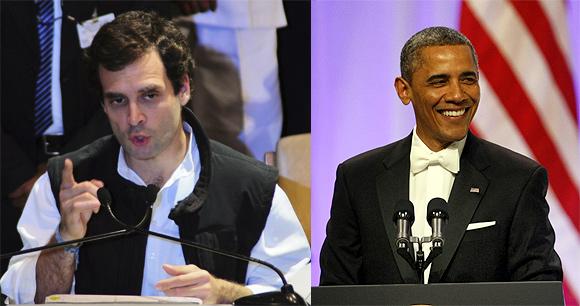
Rahul Gandhi began by plucking at the heartstrings of his party cohorts by referring at length to the sorrows and tragedies of his family.
It was as if he was saying that these sacrifices entitled him to the position bestowed upon him, feels Shreekant Sambrani.
It was definitely not the best of times, nor was it quite the worst of times, for the leaders of the two countries, often grouped together as the two largest democracies in the world.
It was the age of wisdom, it was the age of foolishness, it was the epoch of belief, it was the epoch of incredulity, it was the season of Light, it was the season of Darkness, it was the spring of hope, it was the winter of despair, but these profound observations Charles Dickens had made over 150 years ago as the opening of his magnum opus, A Tale Of Two Cities, apply to our two leaders selectively and differently.
President Barack Obama of the United States and Vice-President Rahul Gandhi of the Indian National Congress share some common datelines.
They both entered their national parliaments in the same year, 2004.
They claimed positions in national politics of their countries in 2007, when Obama announced his candidacy for president and Gandhi was made a general secretary of his party.
Of more immediate interest to us is yet another coincidence: Gandhi made what was virtually his maiden vision statement on January 20. The next day, Obama delivered his second Inaugural address, which is virtually his final vision statement.
...
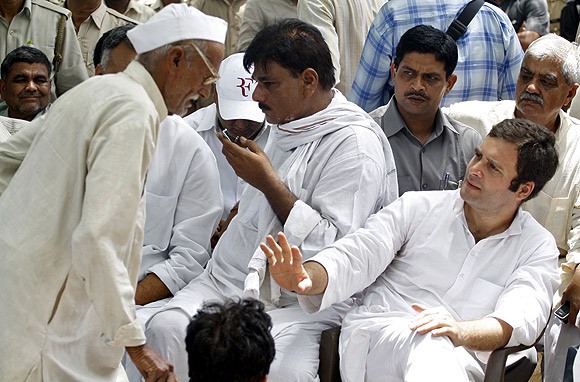
Other parallels between them are more often found in the eyes of beholders than in reality.
Gandhi, at 42, is forever termed young and representative of the next generation by the fawning Indian media (British prime ministers David Cameroun and Tony Blair were under 45 when they assumed office, but not many were concerned about their relative youth).
Obama, only nine years Gandhi's senior, has already been in office for four years.
Gandhi is a leader older than the vast majority of his young country ruled by gerontocracy, while Obama is a relatively younger president of a rapidly ageing country ruled by a younger generation.
Gandhi is called an 'outsider' mainly by his party faithful, but that is largely because this fifth generation scion of a family that has been at the heart India's politics has struck an aloof and detached attitude even as he leapfrogged his way up the ladder.
Obama, too, is sometimes accused of aloofness, but that attitude is not so much a sign of detachment as it is of impatience to get on with what he sees as clear priorities.
This son of an immigrant father and a middle class scholar had no political or business antecedents. He would still be where he is if his last name were to be Olongwo or Gonese, but would a Rahul Saxena or Nambiar have made the Congress vice-president?
One triumphed despite his lineage, while lineage is all for the other.
...
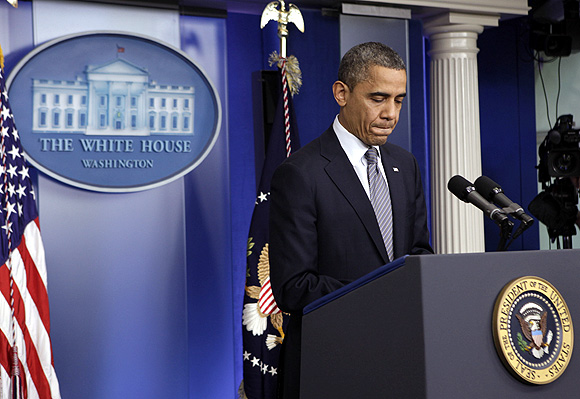
Both men are described as hands-on leaders.
Gandhi reportedly seeks factual details and avoids making grand gestures. It is not clear as yet whether these details have ever led to any specific plans or inform any overall strategy.
Obama has time and again displayed his mastery of facts and his ability to weave them into the larger picture. He did so with equal fluency while talking to auto workers anxious about their jobs or scolding down the erstwhile Masters of the Universe, the finance wizards of Wall Street.
His skillful handling of Superstorm Sandy not only won him votes but also approval of (Chris Christie) the Republican governor of New Jersey, the worst affected state.
He was sensitive to the pain of the country in the aftermath of the Newtown tragedy. He followed his emotive words with some executive measures on gun control.
At about the same time, when India suffered a deep national trauma on its own tragedy of the Delhi Braveheart, Gandhi was missing in action rather than going to the forefront of what is basically his constituency for the asking, the educated young urban middle class.
...

But nothing highlights the difference between Gandhi and Obama as their January landmark speeches.
Gandhi began by plucking at the heartstrings of his party cohorts by referring at length to the sorrows and tragedies of his family. It was as if he was saying that these sacrifices entitled him to the position bestowed upon him.
Obama came to terms with his roots very early on his career, at Philadelphia in March 2008 when he described marvellously what it meant to be an African-American seeking the pinnacle of power in what is still a predominantly white nation.
Later references to his family have only been to emphasise the values it represented, not as a claim on any position due to his descent.
Gandhi called power 'poison' and tried to convey the impression that like his namesake the Mahatma, he was in politics only for the service of the downtrodden.
Obama invoked Martin Luther King: 'Our individual freedom is inextricably bound to the freedom of every soul on Earth.' There was no sham abhorrence of power here; instead, it points out how power could be effectively used.
Gandhi's feigned reluctance and altruistic motive fell off when he stated his priorities: Electing many potential chief ministers in each state, and capturing that poison, power to rule.
...
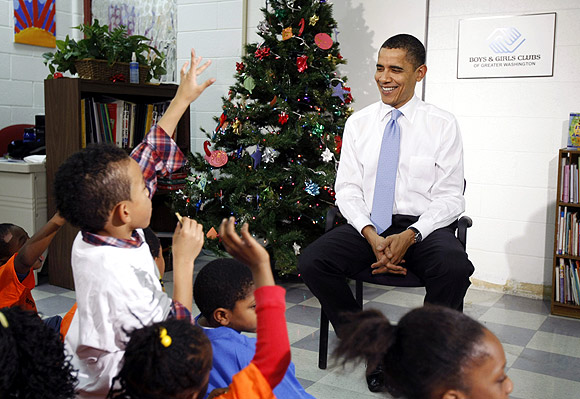
Obama had campaigned in 2008 as a candidate for change. He knew that in 2012 he could not advocate change, because he was the incumbent. He changed his slogan to forward, implying continuity.
Gandhi called for 'total change'. He obviously hoped that no one would remember that his own party was in power for the last eight-and-a-half years, during which time he was the second-in-command in all but name.
Obama's famed oratory scaled new heights as he listed his agenda: 'It is now our generation's task to carry on what those pioneers began.' His reference to 'Seneca Falls, Selma and Stonewall' showed a staunch commitment to equality across gender, origin and sexual preference.
On economic challenges, Obama said, 'We cannot cede to other nations the technology that will power new jobs and new industries -- we must claim its promise. That is how we will maintain our economic vitality and our national treasure -- our forests and waterways; our croplands and snowcapped peaks. That is how we will preserve our planet.'
Obama talked of the need to find enough science and maths teachers, to offer security to children, to welcome immigrants. And he said a lot more about all the relevant issues that concern everyone, which deserves to be read carefully.
...
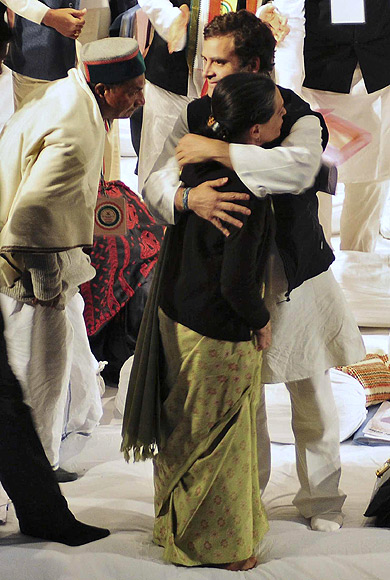
Obama was conscious of continuity legacy, not of his presidency, but of American history: 'We must act, knowing that today's victories will be only partial, and that it will be up to those who stand here in four years, and forty years, and four hundred years hence to advance the timeless spirit once conferred to us in a spare Philadelphia hall.'
By contrast, about the most memorable excerpts of Gandhi's speech are those already mentioned: Sacrifices of his family and that poisonous power. And, of course, his mother hugging him and crying.
Little wonder then that even the Gandhi family friends were embarrassed by this maudlin show and had to take great pains to find something worthwhile or commendable. Most concentrated instead on the atmospherics.
Obama's second Inaugural drew rave reviews. David Brooks, conservative columnist of The New York Times, who is at times supports Obama with qualifications, had felt before the election that the Obama second term would be much like the first one, fraught with frustrations.
On January 21, 2012, he wrote, 'The best Inaugural Addresses make an argument for something. President Obama's second one, which surely has to rank among the best of the past half-century, makes an argument for a pragmatic and patriotic progressivism.'
...

So we see that while one leader embraces political power to carry on with his agenda and seeks support by providing a rousing vision, the other, now formally anointed, finds new ways to extend the stratagem of shedding responsibility like water off a duck's back, while consolidating power.
To go back to Dickens, one had the wisdom, the belief, and the Light, while the other seemed to be engulfed by the opposite of the twains.
No prizes offered for guessing who was which.